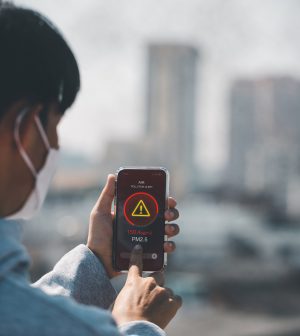- Could Your Grocery Store Meat Be Causing Recurring UTIs?
- Are You Making This Expensive Thermostat Error This Winter?
- Recognizing the Signs of Hypothyroidism
- 10 Strategies to Overcome Insomnia
- Could Artificial Sweeteners Be Aging the Brain Faster?
- Techniques for Soothing Your Nervous System
- Does the Water in Your House Smell Funny? Here’s Why
- Can a Daily Dose of Apple Cider Vinegar Actually Aid Weight Loss?
- 6 Health Beverages That Can Actually Spike Your Blood Sugar
- Treatment Options for Social Anxiety Disorder
Living With Air Pollution Raises Chances of Dementia, Study Finds

People who daily breathe in air pollution, particularly from wildfires or agricultural sources, might need to add a heightened risk of dementia to their list of health concerns.
New research looked at the potential effects of particle pollution on dementia, finding an association even when pollution levels did not exceed national ambient air quality standards. Dementia affects more than 55 million people worldwide, according to the World Health Organization.
While past research has mainly focused on particle pollution from other sources, such as fossil fuels, researchers found a bigger connection to dementia with pollution from farming or wildfires.
“At first, when agriculture and wildfires were the two that popped out,” the team was surprised, study author Dr. Sara Dubowsky Adar, associate chair of epidemiology at the University of Michigan School of Public Health, told CNN.
“In hindsight, it really makes a lot of sense, mostly because of the fact that we’re looking at impacts on the brain, and agriculture we know is using a lot of pesticides,” Adar said.
She noted that pesticides are neurotoxins to animals and may affect human brains.
Wildfires burn not only trees and grasses, but also houses and other buildings, potentially causing more serious environmental problems.
Particulate matter, or PM2.5, can come from burning coal and natural gas, cars, agriculture, wildfires, construction sites and unpaved roads.
It’s tiny, and can evade the body’s defenses, going deep into the lungs or into the bloodstream.
“Just like cigarettes, there’s no such thing as good inhaled particles,” Dr. Caleb Finch, chair in the Neurobiology of Aging at the University of Southern California, told CNN. “Almost everything that air pollution does, cigarette smoke also does.”
In the latest study, researchers used data from more than 27,000 survey participants between 1998 and 2016. About 15% developed dementia during the study period.
All of those individuals lived in areas with higher concentrations of particle pollution than their counterparts without dementia.
It’s possible these particles are entering the brain through the nose. They may be causing neuronal cell death connected to dementia, or changing inflammatory proteins, the researchers said.
On the other hand, air pollution could be having an indirect effect on the brain, Dr. Masashi Kitazawa, an associate professor of environmental and occupational health at the University of California, Irvine, told CNN.
“Is that causing the cardiovascular failure that leads to the less oxygen supply to the brain, and then that caused the accelerating dementia, or is the PM [particulate matter] getting into the brain and causing some neurotoxic reaction? We still don’t know yet,” Kitazawa said.
This research, published Aug. 14 in the journal JAMA Internal Medicine, does not show that air pollution directly causes dementia, Kitazawa noted.
“I don’t want the general public to panic,” Kitazawa said.
Even so, Zhang suggests people limit their exposure to air pollution, despite the challenges of climate change.
Among the ways someone could reduce their exposure include using air purifiers in the home and wearing masks if going outside when there is wildfire smoke in the air, Zhang said.
“Hopefully, this is also one more reason that might motivate people to act on climate change and think about ways in which we can slow the progression of climate change,” Adar said. “We see so many tragic examples with what’s happening right now.”
More information
Here’s more on causes of Alzheimer’s disease.
SOURCE: CNN
Source: HealthDay
Copyright © 2026 HealthDay. All rights reserved.










